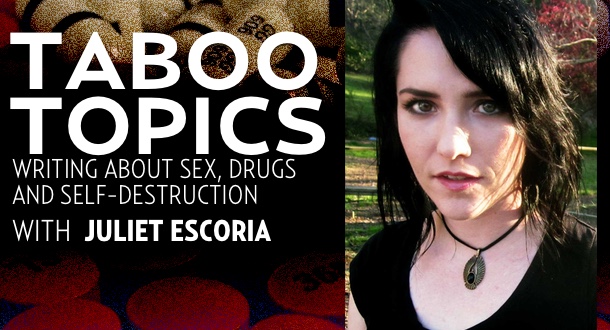
We all have secrets. Things too shocking to reveal in polite company. In this four-week workshop, learn how to exorcise your demons on the page and use them to create writing with real impact.
Your Instructor: Juliet Escoria, author of BLACK CLOUD and WITCH HUNT
Where: Online — Available everywhere!
When: This class is not currently enrolling. To be notified when it is offered again, Click Here
Enrollment: 16 students
Price: $325
Class Description
We all have secrets.
These secrets might be things that have happened to us, things we’ve done, things we’ve thought—things that would shock other people. While parties and job interviews might not be the best place to air them, there's a venue where all that becomes okay: Writing. The written page is a place where we can be our realest, ugliest selves, and by doing so, our work will be the better for it.
In this four-week, hands-on course, you'll explore the role of the transgressive in writing, and dissect work that has challenged us, shocked us, and been banned. You'll consider the role this type of writing has in society, and its ability and duty to push against the confines of social norms, and also make us feel a little bit less like freaks.
And while reading such work can be a liberating, validating act, what happens when we are the ones who are being implicated?
The only path to truly great writing is one where we aren’t afraid of what our mothers might think, but that’s easier said than done. You'll learn how to work through this fear, while maintaining a balance so your work doesn’t fall into the trap of self-righteousness or over-sentimentality.
And guiding you will be Juliet Escoria, author of the acclaimed Witch Hunt and Black Cloud. There'll be lectures, writing assignments, and Q&A's... and don't worry, this is a safe place.
What This Class Covers
WEEK ONE: MANIFESTO
Forbidden work has an important role in our culture. Books that have shocked, offended, and scandalized over time are often that era’s most challenging and valuable works, pushing and shaping the outlines of what is accepted and expected. But if your writing is going to upset people, what are your moral and artistic obligations? Is it always bad to provoke simply for the sake of being provocative? This week, you'll examine the roles and responsibilities of the taboo in literature.
Assignment: Make a quick list (about five or so items) of your favorite works that tackle taboo subject matter. As you go, consider the admirable and compelling qualities of these works, as well as the characteristics each possesses that make them taboo. Then, make a manifesto of what taboo writing should and should not do—its moral obligations, stylistic choices, and importance in society.
WEEK TWO: CRIMES OF THE BODY
This week, you'll examine works that externalize the taboo—violence, sex, problematic relationships, crime, and occupying the wrong space at the wrong time.
Assignment: Write a brief story or scene (500-1,000 words) in which a ‘crime of the body’ takes place.
WEEK THREE: CRIMES OF THE MIND
Now that you've seen what happens when we focus the taboo outward, what happens when we turn it on—or contain it within—ourselves? Topics considered include mental illness, ‘taboo’ emotional states, and revenge.
Assignment: Write a brief story or scene (500-1,000 words) in which a ‘crime of the mind’ takes place.
WEEK FOUR: WHAT WILL YOUR MOTHER THINK?
It’s one thing to write something that explores the most forbidden parts of our minds, and a whole other to send these works out there into the world. What are the risks of such an act, and what are the rewards? What is the alchemy that happens once your thoughts become print? How do you know that you're not leaving anything out simply because you're afraid? Revision and submission strategies will also be discussed.
Assignment: Submit one story, set of poems, or essay based on a previous work or one of the exercises from week 2 or 3.
Goals Of This Class
- Leave with a better understanding of why writing the taboo is so damn important.
- Employ sensory detail that grounds your readers in service of complicated and potentially abstract subject matter.
- Learn to overcome the fear that comes with exposing oneself.
- Ensure your provocations serve a universal purpose.
- Craft a complete short story, chapter, essay, or set of poems and find an appropriate venue of publication.
- Get your completed work critiqued by an acclaimed author.

